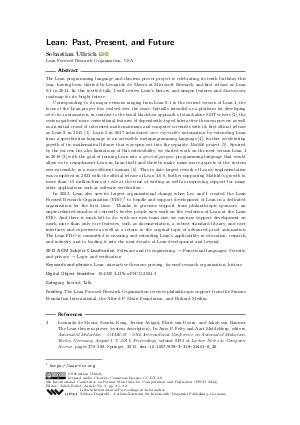Lean: Past, Present, and Future (Invited Talk)
Author
Sebastian Ullrich 
-
Part of:
Volume:
9th International Conference on Formal Structures for Computation and Deduction (FSCD 2024)
Part of: Series: Leibniz International Proceedings in Informatics (LIPIcs)
Part of: Conference: Formal Structures for Computation and Deduction (FSCD) - License:
 Creative Commons Attribution 4.0 International license
Creative Commons Attribution 4.0 International license
- Publication Date: 2024-07-05
File

PDF
LIPIcs.FSCD.2024.3.pdf
- Filesize: 395 kB
- 2 pages
Document Identifiers
Subject Classification
ACM Subject Classification
- Software and its engineering → Functional languages
- Security and privacy → Logic and verification
Keywords
- Lean
- interactive theorem proving
- focused research organization
- history
Metrics
- Access Statistics
-
Total Accesses (updated on a weekly basis)
0PDF Downloads0Metadata Views
Abstract
The Lean programming language and theorem prover project is celebrating its tenth birthday this year, having been started by Leonardo de Moura at Microsoft Research and first release as Lean 0.1 in 2014. In this invited talk, I will review Lean’s history and unique features and discuss our roadmap for its bright future.
Corresponding to its major versions ranging from Lean 0.1 to the current version of Lean 4, the focus of the Lean project has evolved over the years. Initially intended as a platform for developing white-box automation, in contrast to the usual black-box approach of stand-alone SMT solvers [de Moura and Passmore, 2013], the system gathered more conventional features of dependently-typed interactive theorem provers as well as an initial crowd of interested mathematicians and computer scientists with its first official release as Lean 2 in 2015 [Leonardo de Moura et al., 2015]. Lean 3 in 2017 introduced user-extensible automation by extending Lean from a specification language to an accessible metaprogramming language [Gabriel Ebner et al., 2017], further accelerating growth of its mathematical library that was spun out into the separate Mathlib project [{The mathlib Community}, 2020]. Spurred by the success but also limitations of this extensibility, we started work on the next version Lean 4 in 2018 [Leonardo de Moura and Sebastian Ullrich, 2021] with the goal of turning Lean into a general-purpose programming language that would allow us to reimplement Lean in Lean itself and thereby make many more aspects of the system user-extensible, in a more efficient manner [Sebastian Ullrich, 2023]. This to date largest rework of Lean’s implementation was completed in 2023 with the official release of Lean 4.0.0, further supporting Mathlib’s growth to more than 1.5 million lines of code at the time of writing as well as improving support for many other applications such as software verification.
In 2023, Lean also saw its largest organizational change when Leo and I created the Lean Focused Research Organization (FRO) to bundle and support development of Lean in a dedicated organization for the first time. Thanks to gracious support from philanthropic sponsors, an unprecedented number of currently twelve people now work on the evolution of Lean at the Lean FRO. And there is much left to do: with our new team size, we can now support development on much more than only core features, such as documentation, a robust standard library, and user interfaces and experience as well as a return to the original topic of advanced proof automation. The Lean FRO is committed to ensuring and extending Lean’s applicability in education, research, and industry and to leading it into the next decade of Lean development and beyond.
Cite As Get BibTex
Sebastian Ullrich. Lean: Past, Present, and Future (Invited Talk). In 9th International Conference on Formal Structures for Computation and Deduction (FSCD 2024). Leibniz International Proceedings in Informatics (LIPIcs), Volume 299, pp. 3:1-3:2, Schloss Dagstuhl – Leibniz-Zentrum für Informatik (2024)
https://doi.org/10.4230/LIPIcs.FSCD.2024.3
BibTex
@InProceedings{ullrich:LIPIcs.FSCD.2024.3,
author = {Ullrich, Sebastian},
title = {{Lean: Past, Present, and Future}},
booktitle = {9th International Conference on Formal Structures for Computation and Deduction (FSCD 2024)},
pages = {3:1--3:2},
series = {Leibniz International Proceedings in Informatics (LIPIcs)},
ISBN = {978-3-95977-323-2},
ISSN = {1868-8969},
year = {2024},
volume = {299},
editor = {Rehof, Jakob},
publisher = {Schloss Dagstuhl -- Leibniz-Zentrum f{\"u}r Informatik},
address = {Dagstuhl, Germany},
URL = {https://drops.dagstuhl.de/entities/document/10.4230/LIPIcs.FSCD.2024.3},
URN = {urn:nbn:de:0030-drops-203328},
doi = {10.4230/LIPIcs.FSCD.2024.3},
annote = {Keywords: Lean, interactive theorem proving, focused research organization, history}
}
Author Details
Funding
The Lean Focused Research Organization receives philanthropic support from the Simons Foundation International, the Alfred P. Sloan Foundation, and Richard Merkin.
References
- Leonardo de Moura, Soonho Kong, Jeremy Avigad, Floris van Doorn, and Jakob von Raumer. The Lean theorem prover (system description). In Amy P. Felty and Aart Middeldorp, editors, Automated Deduction - CADE-25 - 25th International Conference on Automated Deduction, Berlin, Germany, August 1-7, 2015, Proceedings, volume 9195 of Lecture Notes in Computer Science, pages 378-388. Springer, 2015. URL: https://doi.org/10.1007/978-3-319-21401-6_26.
- Leonardo de Moura and Grant Olney Passmore. The strategy challenge in SMT solving. In Maria Paola Bonacina and Mark E. Stickel, editors, Automated Reasoning and Mathematics - Essays in Memory of William W. McCune, volume 7788 of Lecture Notes in Computer Science, pages 15-44. Springer, 2013. URL: https://doi.org/10.1007/978-3-642-36675-8_2.
- Leonardo de Moura and Sebastian Ullrich. The Lean 4 theorem prover and programming language. In André Platzer and Geoff Sutcliffe, editors, Automated Deduction - CADE 28 - 28th International Conference on Automated Deduction, Virtual Event, July 12-15, 2021, Proceedings, volume 12699 of Lecture Notes in Computer Science, pages 625-635. Springer, Springer, 2021. URL: https://doi.org/10.1007/978-3-030-79876-5_37.
- Gabriel Ebner, Sebastian Ullrich, Jared Roesch, Jeremy Avigad, and Leonardo de Moura. A metaprogramming framework for formal verification. Proc. ACM Program. Lang., 1(ICFP):34:1-34:29, 2017. URL: https://doi.org/10.1145/3110278.
- The mathlib Community. The Lean mathematical library. In Jasmin Blanchette and Catalin Hritcu, editors, Proceedings of the 9th ACM SIGPLAN International Conference on Certified Programs and Proofs, CPP 2020, New Orleans, LA, USA, January 20-21, 2020, CPP 2020, pages 367-381, New York, NY, USA, 2020. ACM. URL: https://doi.org/10.1145/3372885.3373824.
- Sebastian Ullrich. An Extensible Theorem Proving Frontend. PhD thesis, Karlsruhe Institute of Technology, Germany, 2023. URL: https://doi.org/10.5445/IR/1000161074.
